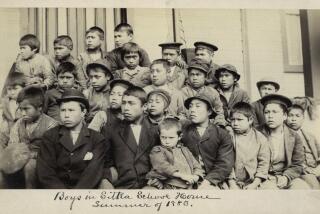‘Little Tree’ Takes a Heavy-Handed Course
- Share via
In all seriousness, “The Education of Little Tree” would have been a perfect vehicle for Mary Pickford. Just change its adorable little half-white, half-Native American hero to a heroine.
Silent film is so much better a medium than talkies for old-fashioned melodrama with its villains of deepest dye. Silents could be preachy, but their messages were confined to intertitles. Early filmmakers were forced to mine visual resources in confronting the harshness of life, and great actors like Pickford could express superbly the pluck and courage necessary to face up to hardship and injustice.
This is not to take anything away from young Joseph Ashton, who is appealing and persuasive as Little Tree, an orphan who in 1935 goes to live with his grandparents in their two-room cabin in the Smoky Mountains of Tennessee. As a moonshiner, his grandfather (James Cromwell) proudly carries on in the distilling tradition of his Scottish ancestors. Little Tree’s Cherokee grandmother (Tantoo Cardinal) will teach him all she knows of the three Rs while instructing him in his Native American heritage with an emphasis on its spiritual values.
So far so good, but writer-director Richard Friedenberg, working from Forrest Carter’s novel, lays on the political correctness with a fatally heavy hand. Of course, America’s treatment of its native people has been a genocidal disgrace, but every white person in the picture is a buffoon or a racist or both, aside from the grandfather, who has embraced Cherokee culture and renounced his own, and a dirt-poor little girl (Mika Boorem, very winning) whom Little Tree befriends.
Of course, too, such deplorable white people existed and still do, but there’s no balance in Friedenberg’s vision. This undercuts the film’s dramatic crisis, which finds Little Tree taken away to an Indian school, a virtual Alcatraz, where every trace of Native American culture is to be eradicated and where discipline is not merely old-fashioned but brutal to the point of endangering the lives of the students. This sequence, historically valid for sure, would be so much more powerful if it were offset with a couple of decent white folks elsewhere in the film. This lack helps tip the school sequences in the direction of unintentional parody.
Friedenberg’s heavy-handedness throws in relief his film’s flaws. For example, it makes us think about the grandfather’s decision to teach his grandson moonshining as “something to fall back on,” without the grandfather ever explaining just how Little Tree is to have the opportunity to acquire another skill.
There’s enough dimension to the grandfather’s role to enable Cromwell to bring him alive. Cardinal has much presence but is mainly asked to seem noble, as is Graham Greene as a Cherokee shaman, aside from his moving account of the systematic decimation of the Cherokee Nation exemplified by the ordeal of the Trail of the Tears. That came in 1835, when President Martin Van Buren ordered federal troops to remove 18,000 Cherokees from Georgia, where gold had been discovered, to land west of the Mississippi.
Filmed almost entirely in Canada, “The Education of Little Tree,” with its wilderness settings, has considerable visual splendor. Prolific and gifted composer Mark Isham has come up with a stirring score that supports the film’s high-mindedness expertly but is not likely to be ranked among his best work.
* MPAA rating: PG, for language and thematic elements, including old-fashioned discipline. Times guidelines: Discipline is more brutal and savage than old-fashioned.
(BEGIN TEXT OF INFOBOX / INFOGRAPHIC)
‘The Education of Little Tree’
Joseph Ashton: Little Tree
James Cromwell: Granpa
Tantoo Cardinal: Granma
Graham Greene: Willow John
A Paramount presentation in association with Allied Films/Lightmotive. Director Richard Friedenberg. Producer Jake Eberts. Screenplay by Friedenberg; based on the novel by Forrest Carter. Cinematographer Anastas Michos. Editor Wayne Wahrman. Costumes Renee April. Music Mark Isham. Production designer Dan Bishop. Art director Peter Stratford. Key decorator Andre Chamberland. Running time: 2 hours, 10 minutes.
* Opens Thursday exclusively at the Mann Regent, 1045 Broxton Ave., Westwood, (310) 289-6266.
More to Read
Only good movies
Get the Indie Focus newsletter, Mark Olsen's weekly guide to the world of cinema.
You may occasionally receive promotional content from the Los Angeles Times.










